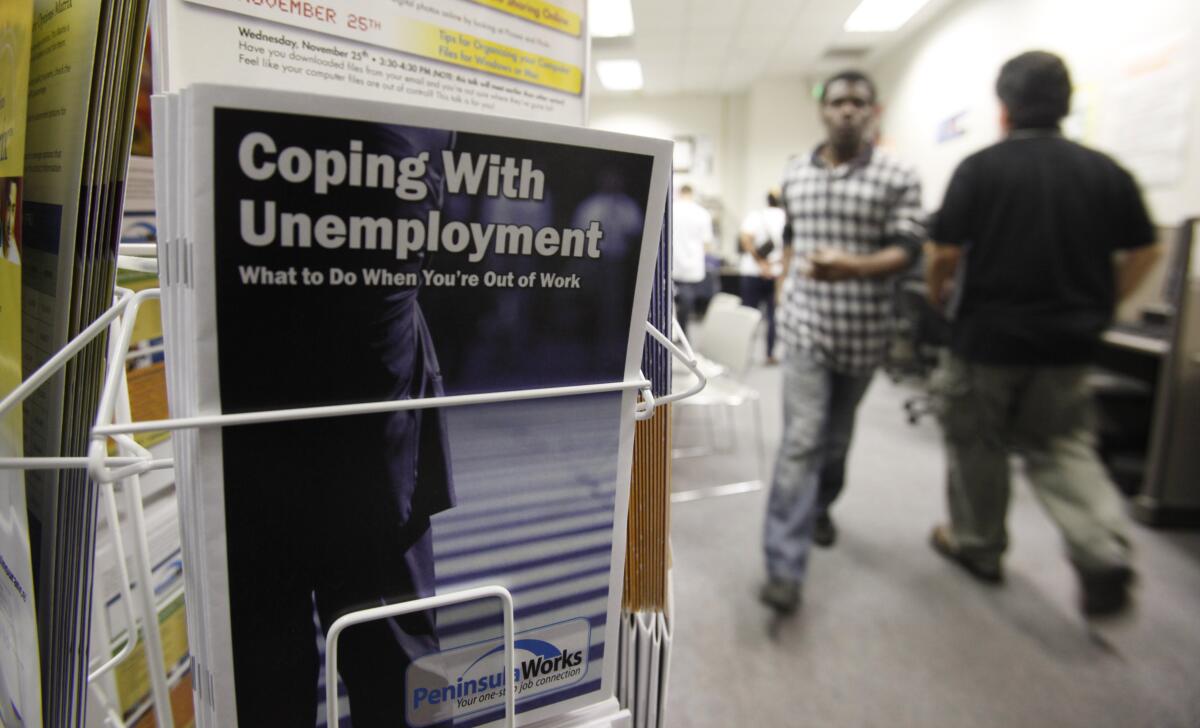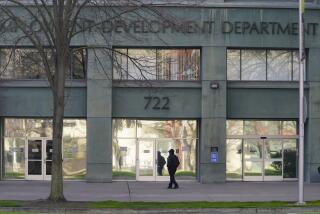California unemployment fraud could top $9 billion, double previous estimate, expert warns

- Share via
SACRAMENTO — As an army of investigators tries to pin down the scope of unemployment benefit fraud in California, the head of a security firm working for the state is warning that payments of fraudulent claims could more than double the $4 billion previously estimated, and that a flood of those claims involve overseas crime rings.
At least 10% of unemployment claims may have been fraudulent before controls were installed in October, according to Blake Hall, founder and chief executive of the company ID.me., which has been hired by the state Employment Development Department to weed out fraud. A 10% fraud rate could total $9.8 billion of the benefits paid from March through September.
Much of the fraud in California and other states is coming from organized criminal gangs operating in some 20 foreign countries, including Russia, China, Nigeria, Ghana, Turkey and Bulgaria, Hall said.
“When the Russians and the Nigerians and the Chinese are the players on the field, they are going to put up some points,” Hall told The Times. “This is a very sophisticated cyberattack that’s being run at scale.”
Hall’s firm was hired by the EDD to begin checking unemployment claims in October, and since then 30% of the claims it screened turned out to be fraudulent. Between Oct. 1 and Jan. 11, Hall said his firm blocked 463,724 fraudulent claims, which he said would represent more than $9 billion if the EDD had paid $20,000 on each claim.
The EDD has so far paid out $113 billion in unemployment benefits during the 10 months of the COVID-19 pandemic, including $43 billion as part of an expedited — and less secure — Pandemic Unemployment Assistance program for independent contractors, gig workers and the self-employed.
California’s Employment Development Department sent more than $42 million in coronavirus benefits to prison inmates in other states, according to an analysis reviewed by The Times.
State officials were recently warned by Bank of America, which is under contract with the EDD to issue debit cards to distribute benefits, that there is evidence that fraud could total more than $4 billion in California. A task force of county, state and federal law enforcement officers and prosecutors is continuing an investigation to identify all of the fraud, which has also involved claims in the names of prison inmates.
Hall said that typically 10% of unemployment claims nationwide are fraudulent.
A similar warning was issued nationwide in November by the Office of Inspector General for the U.S. Department of Labor.
“Conservatively, assuming improper payments continue at 10%, at least $36 billion of the $360 billion expended under the CARES Act as of November 7, 2020, could be paid improperly, with a significant portion attributable to fraud,” the office said in a report.
Hall, whose company provides security for 14 states’ unemployment agencies, estimated that about 40% of claims in the Pandemic Unemployment Assistance program may be fraudulent.
“That would be consistent with what we are seeing across the country,” Hall said.
California paid out $35.7 billion in PUA benefits through Oct. 3; 40% of that would total $14 billion.
EDD director Rita Saenz, who took over the agency on Jan. 1, said she is concerned about the level of fraud she is hearing about from ID.Me and others.
“This type of criminal assault on the benefits system is unprecedented,” Saenz said in an interview. “My intention is to do everything we can, working with our law enforcement partners, to catch whoever is doing it and bring them to justice.”
Saenz said she could not comment on the possibility of fraud reaching $9.8 billion or more.
State lawmakers say they’ve been flooded with desperate calls from constituents who don’t understand why their jobless benefits have been cut off by EDD.
“We are still ferreting through the amount of fraud that has been committed, so I can’t give you a firm number. We are still looking,” she said.
Legislators are concerned because efforts to fight fraud have harmed people with legitimate unemployment claims. Last month, the EDD suspended payment on 1.4 million claims while they investigate potential fraud.
Stan George, a database administrator from Carlsbad whose company had mass layoffs in April, is one of those whose claims were suspended.
“I think it’s criminal,” said George, 62, of the EDD’s actions. He said he called an EDD phone line during business hours and only got a message saying he needed to call back during business hours.
Bank of America has also frozen tens of thousands of benefit debit cards as it investigates potential fraud, leaving jobless Californians unable to access their money. On Thursday, a federal lawsuit was filed by a San Francisco woman alleging the bank failed to properly safeguard the accounts of EDD debit cardholders and later handle fraud claims when made.
“My account was emptied by unauthorized transactions on my Bank of America EDD debit card,” said the plaintiff, Jennifer Yick, who lost her real estate job. “When I tried to report the fraud to the bank, I was repeatedly disconnected, told to call back later, transferred to various departments to no end.”
A representative of the bank responded Friday by saying Bank of America has added thousands of agents to answer phones and help customers with problems involving their claims.
“As California’s unemployment program faces billions of dollars in fraud, Bank of America is working every day with the state to prevent criminals from getting money and ensuring legitimate recipients receive their benefits,” said Bill Halldin, a spokesman for the bank.
California has been hit particularly hard by fraud because it has the largest population and is paying out the most in benefits of any state, Hall said.
“It’s better to target a big state like California or New York because it’s not quite apparent there is fraud like it would be if you were targeting a state with a more rural population,” Hall said.
Among the factors that have contributed to fraud is that Congress has approved billions of dollars in supplemental unemployment benefits and allowed claims to be filed seeking benefits retroactive to February. As a result, many claims being paid are totaling $20,000.
“You have billions of dollars in federal aid and this backdating feature that makes these flows the most valuable target that organized crime has ever focused on,” Hall said. “It’s just classic supply and demand.”
Some of the fraud has been blocked after it was determined that the person in whose name a claim was filed did not match the name of the owner of the cellphone used to file the claim, and by a requirement that claimants appear live on camera with ID.me to verify their identity.
Some fraudsters have been caught holding up paper or digital photos of the alleged claimant during the live chats. In one case, a caregiver for a severely disabled man took him into the restroom to put him on camera with ID.me, but that attempt was foiled when the security screener asked the disabled man for Social Security information, Hall said.
He said foreign fraud rings are using stolen identity information to file fraudulent claims and then using “money mules” in the United States to pick up debit cards sent out by the EDD, often to vacant houses.
Hall cited evidence of foreign involvement, including the tracing of phone numbers on fraudulent claims to other countries and chatter on the dark web in which foreign fraudsters talk about their schemes.
After ID.me started screening claims in some states, the Virginia-based company was hit with cyberattacks originating in Hong Kong, Moscow and countries including Nigeria that were aimed at knocking out its computer system, although the attacks were foiled, Hall said.
He estimated that foreign crime rings have filed hundreds of thousands of fraudulent unemployment claims in the United States.
Saenz said she believes her agency is stopping the hemorrhaging of benefits to fraud since it hired security firms including ID.me and Thomson Reuters.
“I think EDD is getting a handle on this,” Saenz said.
More to Read
Sign up for Essential California
The most important California stories and recommendations in your inbox every morning.
You may occasionally receive promotional content from the Los Angeles Times.













